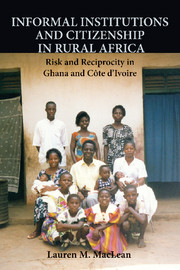 Informal Institutions and Citizenship in Rural Africa
Informal Institutions and Citizenship in Rural Africa Book contents
- Frontmatter
- Contents
- List of Tables and Figures
- List of Abbreviations
- Acknowledgments
- PART I THE TRANSFORMATION OF INFORMAL INSTITUTIONS OF SOCIAL RECIPROCITY IN GHANA AND CÔTE D'IVOIRE
- PART II LEGACIES OF THE STATE ROLE IN MEDIATING RISK IN GHANA AND CÔTE D'IVOIRE
- PART III INFORMAL INSTITUTIONS OF RECIPROCITY AND THE PROSPECTS FOR DEMOCRATIC CITIZENSHIP
- 7 Transformations of the Informal Institutions of Reciprocity and the Implications for Citizenship
- 8 Conclusion
- Appendix
- Bibliography
- Index
- Titles in the series
7 - Transformations of the Informal Institutions of Reciprocity and the Implications for Citizenship
Published online by Cambridge University Press: 05 May 2010
- Frontmatter
- Contents
- List of Tables and Figures
- List of Abbreviations
- Acknowledgments
- PART I THE TRANSFORMATION OF INFORMAL INSTITUTIONS OF SOCIAL RECIPROCITY IN GHANA AND CÔTE D'IVOIRE
- PART II LEGACIES OF THE STATE ROLE IN MEDIATING RISK IN GHANA AND CÔTE D'IVOIRE
- PART III INFORMAL INSTITUTIONS OF RECIPROCITY AND THE PROSPECTS FOR DEMOCRATIC CITIZENSHIP
- 7 Transformations of the Informal Institutions of Reciprocity and the Implications for Citizenship
- 8 Conclusion
- Appendix
- Bibliography
- Index
- Titles in the series
Summary
Over the past 100 years, what were similar village communities in these Akan regions of Ghana and Côte d'Ivoire have become very different. The informal institutions of reciprocity have changed and continue to be transformed. These great transformations were not the same in the two regions, however. The different legacies of state formation in political administration, social service provision, and agricultural policy have stimulated variations in the quantity of help exchanged, extent of participation in reciprocal exchange, and structure of social ties involved in informal social reciprocity. The parameters of social exclusion and inclusion have been redrawn in different ways. And as a consequence, the local hierarchies of political power have also changed.
These transformations of reciprocity are about connection and disconnection, inclusion and exclusion, with critical consequences for citizenship and democracy in rural Ghana and Côte d'Ivoire. In this chapter, I explore the contrasts in indigenous meanings of citizenship and everyday political practices at the village level in these two regions. Then, expanding the focus, I look at how these surprising differences in village political cultures and practices shape the ways village residents participate in politics at the national level. This analysis sheds light on why Ghana has become an economic and political success story, whereas the former “miracle” of Côte d'Ivoire has become mired in ethnoregional civil conflict.
Before proceeding, it is important to qualify my claims.
- Type
- Chapter
- Information
- Informal Institutions and Citizenship in Rural AfricaRisk and Reciprocity in Ghana and Côte d'Ivoire, pp. 199 - 226Publisher: Cambridge University PressPrint publication year: 2010
